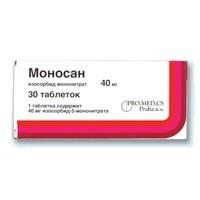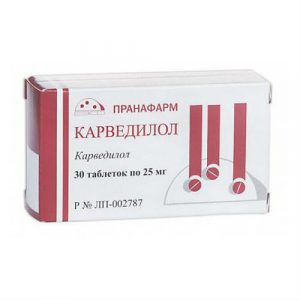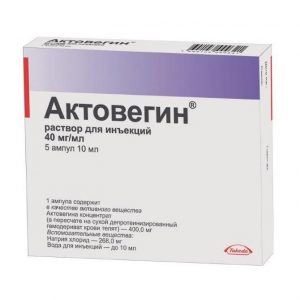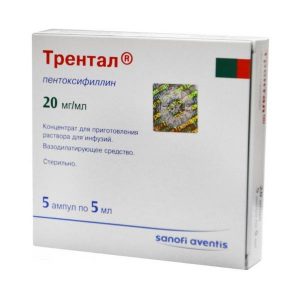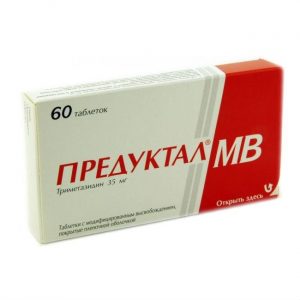Description
Release form
Tablets.
Packing
30 pcs.
Pharmacological action
Monosan – antianginal drug. Peripheral vasodilator with a primary effect on venous vessels. Stimulates the formation of nitric oxide (endothelial relaxing factor) in the vascular endothelium, causing activation of intracellular guanylate cyclase, the consequence of this is an increase in the level of cGMP (vasodilation mediator).
Reduces myocardial oxygen demand by reducing preload and afterload. It has a coronary expansion effect. Reduces blood flow to the right atrium, helps to reduce pressure in the pulmonary circulation and regression of symptoms in pulmonary edema.
Promotes redistribution of coronary blood flow in areas with reduced blood supply. Increases exercise tolerance in patients with coronary artery disease, angina pectoris.
Expands the vessels of the brain, the dura mater, which may be accompanied by a headache.
As with other nitrates, cross-tolerance develops to the drug. After cancellation (interruption of treatment), sensitivity to the drug is quickly restored. The antianginal effect develops 30-45 minutes after taking the drug and lasts up to 8-10 hours.
Indications
– prevention of angina attacks in patients with coronary heart disease
– chronic heart failure (as part of combination therapy)
– pulmonary hypertension, pulmonary heart (as part of combination therapy).
Contraindications
– arterial hypotension and arterial hypovolemia (systolic blood pressure below 100 mmHg, diastolic pressure below 60 mmHg, central venous pressure below 4-5 mmHg)
– shock, vascular collapse
– left ventricular failure with low diastolic pressure
– acute myocardial infarction (with severe arterial hypotension)
– cardiac tamponade
– shock
– toxic pulmonary edema
– diseases accompanied by an increase in intracranial hemorrhage (including stroke, head injury)
– angle-closure glaucoma
– lactation (breastfeeding)
– children and adolescents under 18
– hypersensitivity to the components of the drug Monosan and other nitrates.
Caution: with aortic and / or mitral stenosis, with a tendency to orthostatic disorders of vascular regulation, with constrictive pericarditis, elderly patients, with severe anemia, thyrotoxicosis, with hypertrophic cardiomyopathy (it is possible to increase the incidence of angina pectoris), with the risk of liver failure methemoglobinemia), severe renal failure.
Use during pregnancy and lactation
Use of Monosan during pregnancy is only possible in cases where the intended benefits to the mother outweigh the potential risk to the fetus.
Special instructions
Monosan is not used for the relief of angina attacks.
During therapy, it is necessary to monitor blood pressure, heart rate.
If it is necessary to use the drug against the background of arterial hypotension, drugs with a positive inotropic effect should be taken at the same time.
Frequent use and use in high doses can cause tolerance in this case, after 3-6 weeks of regular use, it is recommended to cancel Monosan for 24-48 hours or interrupt therapy for 3-5 days with replacing the drug with other antianginal drugs at this time.
Avoid abrupt discontinuation of the drug and reduce the dose gradually.
Influence on the ability to drive vehicles and control mechanisms
During the period of use of the drug, the patient’s psychomotor reactions may decrease, so you should carefully drive vehicles and engage in potentially dangerous activities that require an increased concentration of attention and speed of psychomotor reactions.
Composition
1 tablet: – isosorbide-5-mononitrate 40 mg.
Excipients: microcrystalline cellulose, corn starch, magnesium stearate, granular lactose, talc.
Dosage and administration
Set individually depending on the severity of the disease.
The initial single dose of Monosan is 10-20 mg, the frequency of administration is 1-3 times / day.
Depending on the severity of the clinical effect, from 3-5 days of therapy, a single dose of the drug can be increased to 40-60 mg with the same frequency of administration. The maximum daily dose is 80 mg.
Tablets should be taken orally after a meal, swallow whole with a small amount of liquid.
Side effects of
Cardiovascular: nitrate headache, dizziness, transient sensation of hyperemia a marked decrease in blood pressure is rare – a paradoxical increase in angina attacks, orthostatic collapse.
From the digestive system: nausea, vomiting, dry mouth, a sensation of a slight burning sensation of the tongue is possible.
From the side of the central nervous system: stiffness, drowsiness, blurred vision, decreased ability to quickly psychic and motor reactions (especially at the beginning of treatment) rarely – cerebral ischemia.
Allergic reactions: skin rash rarely – exfoliative dermatitis.
Others: development of tolerance (including cross-tolerance to other nitrates).
Drug interaction
When used together, Monosan increases the concentration of dihydroergotamine in the blood plasma.
With combined use, barbiturates accelerate biotransformation and reduce the concentration of isosorbide mononitrate in blood plasma.
With the combined use of isosorbide mononitrate with antihypertensive agents, peripheral vasodilators, antipsychotics (antipsychotics), tricyclic antidepressants, novocainamide, ethanol, quinidine, beta-adrenergic blocking agents, slow calcium idirogens, blockers of hypoglyceride potentiogenesis, it is possible.
With a combination of amiodarone, propranolol, slow calcium channel blockers (verapamil, nifedipine, etc.), acetylsalicylic acid and isosorbide mononitrate may enhance the antianginal effect.
When combined with beta-adrenostimulants, alpha-adrenergic blockers, a decrease in the severity of the antianginal effect (the development of tachycardia, an excessive decrease in blood pressure) is possible.
When combined with m-anticholinergics (atropine), the likelihood of increased intraocular pressure increases.
When taken simultaneously, adsorbents, astringents and enveloping agents reduce the absorption of isosorbide mononitrate from the gastrointestinal tract.
Overdose
Symptoms: headache, dizziness, palpitations, hyperthermia, skin hyperemia, sweating, nausea, vomiting, diarrhea, methemoglobinemia (cyanosis, anoxia), hyperpnoea, dyspnoea, bradycardia, convulsions, visual disorders, increased intracranial pressure, collapse, fainting, paralysis, coma.
Treatment: gastric lavage with methemoglobinemia – in or in / ascorbic acid 1 g, in / in – 1% solution of methylthioninium chloride (methylene blue) at a dose of 1-2 mg / kg body weight. Symptomatic therapy for severe arterial hypotension – in / in phenylephrine (epinephrine and its related compounds are ineffective).
Deystvuyuschee substances
isosorbide mononitrate
Terms of delivery from
pharmacies Prescription
Dosage form
tablet
Indications
angina, Hronycheskaya failure circulation
PRO.CS Prague, Czech Republic
